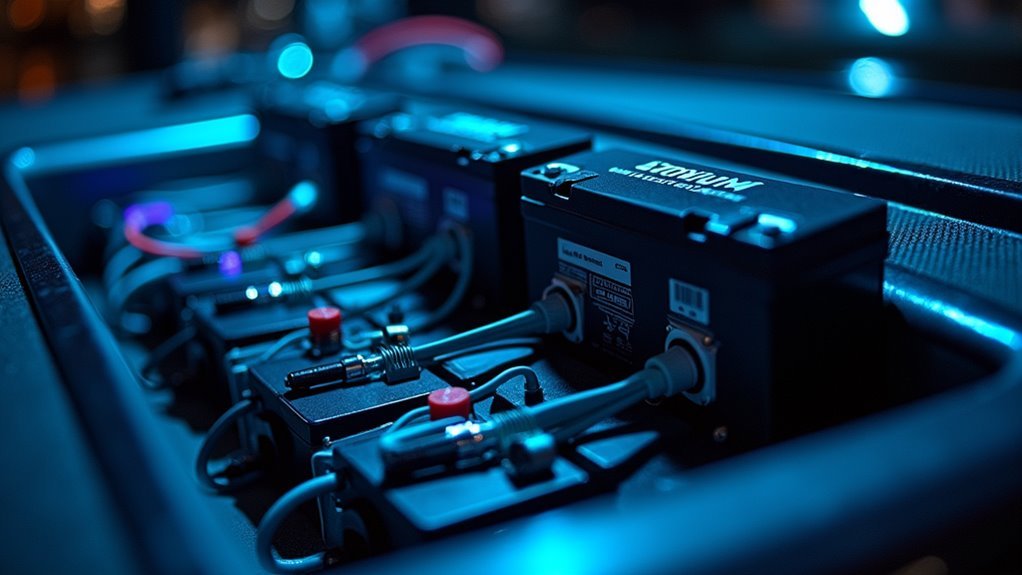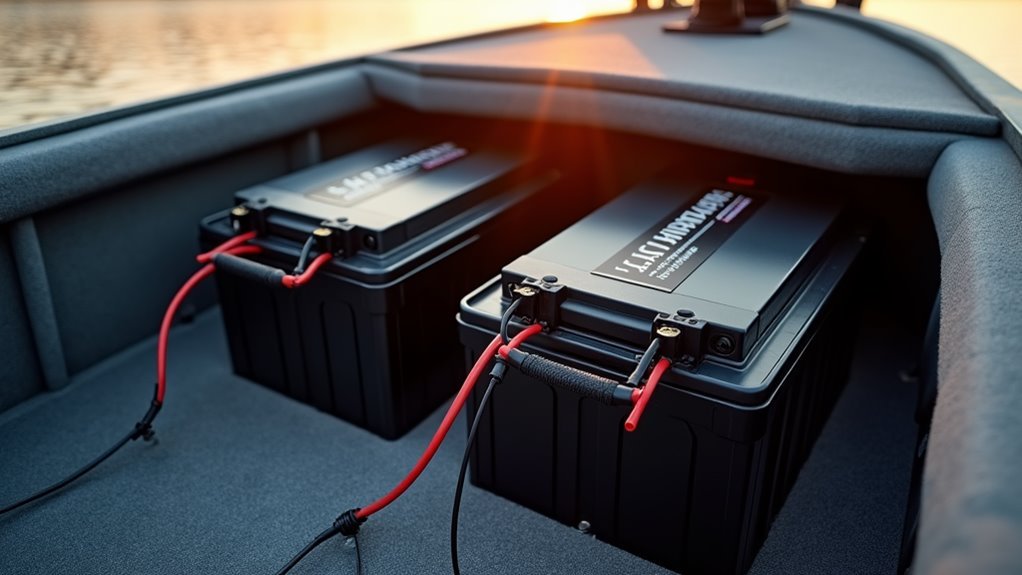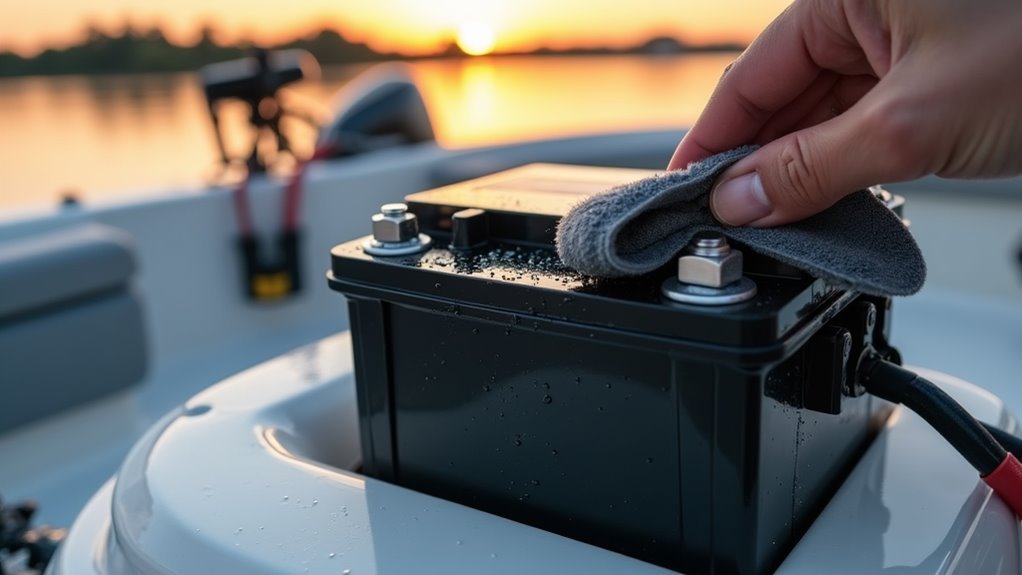We've seen a significant shift in trolling motor technology as more anglers make the switch to lithium batteries. While the upfront cost might cause some sticker shock, these advanced power units offer an impressive lifespan that can transform how we spend our time on the water. Let's explore why these batteries last between 4 to 10 years and what factors influence their longevity. Whether you're considering an upgrade or just weighing your options, understanding the true value of lithium batteries will help you make an informed decision for your boating future.
Understanding Lithium Battery Lifespan
While traditional lead-acid batteries have limited lifespans, lithium trolling motor batteries offer exceptional longevity that can transform your time on the water.
We're talking about 4 to 10 years of reliable performance compared to just 1 to 3 years with older technology.
What makes these batteries truly remarkable is their impressive 2,000 to 5,000 charge cycles – that's up to ten times more than traditional lead-acid options.
Even after extensive use, they'll maintain about 70% of their capacity, keeping you powered up longer.
You won't need to worry about constant maintenance either, as there's no need for electrolyte checks or water additions.
While environmental factors and usage patterns can affect lifespan, these batteries are built tough to handle challenging conditions better than their predecessors.
Types of Trolling Motor Batteries
When choosing a trolling motor battery, you'll find four main types available in today's market: traditional lead-acid, AGM, gel, and lithium batteries.
Let's explore your options for deep cycle batteries, each with unique features that affect lifespan, maintenance, and energy output capacity.
- Traditional Lead Acid Batteries offer affordability but need regular maintenance and last 1-3 years.
- AGM Batteries provide maintenance-free operation with a 4-6 year lifespan.
- Gel Batteries deliver spill-proof safety with a 3-5 year service life.
- Lithium Batteries boast the longest lifespan at 4-10 years with maximum discharge capability.
We're seeing more anglers switch to lithium batteries because they can discharge to 100% capacity without damage, unlike other types that shouldn't go below 50%.
While they cost more upfront, their extended lifespan and minimal maintenance requirements make them worth considering.
Power Requirements and Performance

Understanding your trolling motor's power requirements helps determine the right lithium battery capacity for ideal performance.
When we're out on the water, we need to take into account that our power draw typically runs at about 30% of maximum capacity during regular fishing. This means we can expect 6-8 hours of runtime from a fully charged 12V lithium battery with 50-pound thrust.
We'll get the most from our trolling motor battery by knowing that lithium batteries maintain strong performance even at 90% discharge, keeping 70% of their capacity.
When we're calculating runtime, we need to factor in our total power draw – including any electronics we're running. For example, with a 100Ah battery and 27A total draw, we'll get about 3.7 hours of solid performance on the water.
Battery Capacity Explained
Before choosing a lithium trolling motor battery, we need to grasp how battery capacity affects our time on the water.
Battery capacity, measured in amp hours (Ah), tells us how much power we'll have for our adventures.
Let's break down what makes lithium batteries the perfect companion for freedom-seeking boaters.
- Higher capacity batteries (like 100Ah) give us flexibility to run at different power levels.
- We can use 100% of our battery's depth of discharge, unlike traditional lead-acid batteries.
- Superior energy density means we get more power in a lighter package.
- Understanding total power draw helps us maximize our run time on the water.
Charging Cycles and Longevity

The impressive lifespan of lithium trolling motor batteries sets them apart from traditional alternatives. We'll see superior performance with 2,000-5,000 charging cycles compared to lead-acid batteries' mere 300-500 cycles. When we properly maintain these lithium batteries, they'll serve us for up to 10 years!
| Feature | Lithium | Lead-Acid |
|---|---|---|
| Charging Cycles | 2,000-5,000 | 300-500 |
| Lifespan | 10 years | 1-3 years |
| Discharged Capacity | 70% retained | Limited |
What's even better? These batteries have no memory effect, so we can charge them whenever needed without worry. By following ideal charging practices and avoiding deep discharges, we'll maximize their efficient usage and enhance longevity. That's real freedom from constant battery replacements and maintenance headaches!
Environmental Impact on Battery Life
While lithium trolling motor batteries offer impressive performance, environmental conditions play a significant role in their longevity and efficiency.
We've found that monitoring charge levels and understanding how temperature extremes affect battery performance is imperative for maintaining ideal runtime.
Let's look at the key environmental factors that impact your battery's lifespan:
- Temperature sweet spot stays between 32°F to 113°F for best performance
- Cold water conditions increase power draw, potentially reducing runtime
- High temperatures can speed up battery degradation
- Proper storage in cool, dry places helps maximize longevity
We can maintain up to 70% capacity even at 90% discharge, but it's important to keep an eye on environmental conditions.
Regular monitoring of our batteries' voltage and discharge rates helps prevent issues and extends their service life.
Maintenance Best Practices

Maintaining lithium trolling motor batteries properly can extend their lifespan to a decade or more.
We'll want to keep a close eye on charge levels, never letting them drop below 20% to prevent deep discharges that can harm the battery. It's essential that we use a compatible lithium battery charger in a cool, dry environment.
Let's make routine inspections part of our maintenance best practices. We should check terminals and connections regularly, keeping them clean and tight to guarantee peak performance.
When we're not using our batteries, we'll want to store them in a cool, dry place with a charge between 50-75%. Following these simple steps will maximize battery health and enhance longevity, letting us enjoy more time on the water without worrying about our power source.
Real-World Usage Results
Field testing reveals impressive performance metrics for lithium trolling motor batteries in real-world conditions.
We've gathered extensive data showing just how long these powerful batteries last in actual use, and the results are exciting for anglers who want maximum time on the water.
Here's what real-world usage tests have shown:
- 50Ah lithium batteries consistently deliver full-day fishing performance
- 100Ah models typically power boats for two or more days between charges
- Following charging guidelines leads to 4-10 years of reliable service
- Run times reach 6-8 hours with 50-pound thrust motors
We've found that lithium batteries greatly outperform traditional options, even in challenging conditions.
While temperature and usage patterns affect performance, proper maintenance guarantees you'll get years of dependable service from your trolling motor battery.
Frequently Asked Questions
Why Are Lithium Batteries Not Recommended for Trolling Motors?
Money talks, but lithium's drawbacks speak louder. We've found their costly charging systems, cold-weather performance issues, and compatibility concerns often outweigh their weight benefits and charging speed advantages for trolling setups.
Is a 100AH Lithium Battery Enough for a Trolling Motor?
We'll get 6-8 hours from a 100AH lithium battery with a standard trolling motor, but consider your specific power needs and usage patterns before committing. Higher speeds will reduce runtime considerably.
How Many Years Does a Lithium Battery Last?
We've found lithium batteries typically last 4-10 years with proper maintenance. They'll maintain strong capacity through thousands of charging cycles, especially when we avoid deep discharges and store them at proper temperatures.
Do Lithium Marine Batteries Last Longer?
You'd think traditional batteries win, but we've found lithium marine batteries last 3-7 years longer, offering superior charging efficiency and lower maintenance, despite their higher upfront cost compared to lead-acid options.